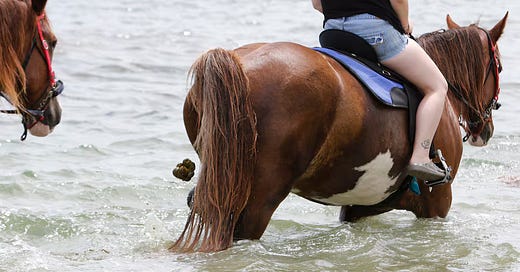Ongoing debate over horseback rides along Bradenton's Palma Sola Bay continue
Leaders from Suncoast Waterkeeper, an environmental watchdog group, have unveiled new findings suggesting a connection between popular horseback rides along Bradenton’s Palma Sola Bay and water pollution. According to the group, DNA evidence indicates that horse manure from these rides is introducing potentially harmful bacteria into the water, rendering it unsafe for swimming. Moreover, the nutrients from this waste can exacerbate the growth of harmful algal blooms, and there are concerns about the horses damaging seagrass through their activities.
Suncoast Waterkeeper's Executive Director, Abbey Tyrna, expressed dismay over the current situation, stating, “The fact that we’re allowing these horses to just defecate in the water is mind-boggling.” She emphasized that their testing has identified elevated levels of enterococci bacteria, attributing at least some of it to the horses.
In response, Carmen Hanson, owner of C Ponies Horseback Rides, contested these claims, asserting that operators diligently clean the beach and remove most waste from the water. Hanson argued that horse manure poses minimal risk to human health and suggested that focusing on horses diverts attention from more significant sources of bay pollution, such as municipal wastewater spills and stormwater runoff.
Despite these conflicting views, Suncoast Waterkeeper is urging Bradenton officials to take action, citing the DNA evidence as grounds for regulating horseback ride operators and preventing further contamination of the habitat.
Bradenton officials have expressed a cautious approach, seeking additional information before making any regulatory decisions. The Sarasota Bay Estuary Program (SBEP), tasked with advising the city council on water quality matters, supports conducting a study to determine the horses' precise impact on bay pollution levels.
David Tomasko, Executive Director of SBEP, emphasized the need for thorough research to gauge whether horses significantly contribute to bacterial contamination. He noted that while horses may cause localized damage, the overall health of the bay appears positive.
The ongoing debate in Bradenton over regulating horse rides along Palma Sola Causeway underscores the complexities involved in balancing environmental concerns with recreational activities. Previous attempts to address these issues have stalled due to disagreements among city leaders and uncertainty regarding jurisdiction over the causeway.
Meanwhile, the Florida Department of Health continues to monitor water quality and issue advisories when bacteria levels, potentially linked to fecal matter, are deemed unsafe for swimming. Suncoast Waterkeeper conducts its own testing, consistently finding elevated bacteria levels on the north side of the causeway where horses are known to swim.
Looking ahead, Suncoast Waterkeeper advocates for implementing best management practices and possibly restricting horse activities to safeguard water quality. Tyrna suggested practical measures like limiting the depth horses are allowed to enter the water and setting maximum numbers per session.
As discussions continue, stakeholders remain divided on the best course of action, with horse ride operators striving to demonstrate their commitment to environmental stewardship. The city council awaits further guidance from SBEP before making any definitive moves, acknowledging the complexity of the situation and the need for informed decision-making based on comprehensive data.


